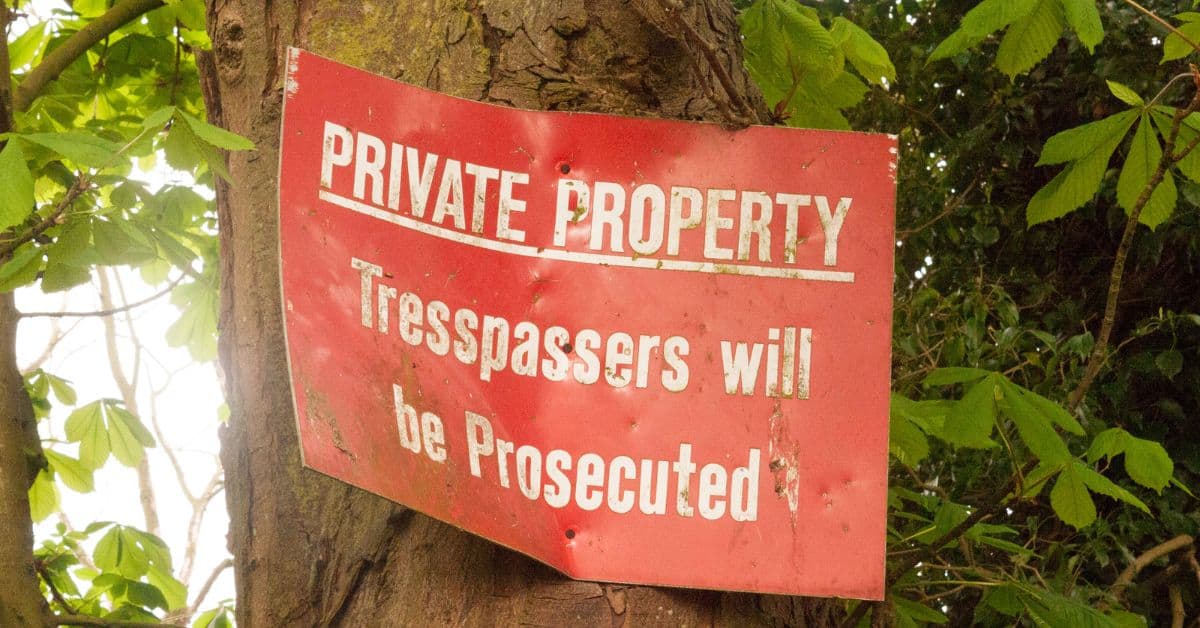The thrill of spontaneous adventure often leads many to the wonders of wild camping. Yet, when in the UK, this seemingly innocent activity might come with strings attached. Delving into the punishment for wild camping in the UK requires an understanding of where and when wild camping is permitted, the rules surrounding it, and the nuances of national parks.
This guide will help you navigate the intricacies of the wild camping laws so that your next wild camping trip in the UK can be both memorable and compliant. Whether you’re drawn to the vast expanses of Scotland or the rolling hills of England, knowledge is your best companion.
Disclaimer: If you make a purchase via the links on our site, I may earn an affiliate commission at no additional cost to you. You can read my affiliate disclosure in the privacy policy. Thanks for your support!
Understanding Wild Camping
Wild camping is the act of pitching a tent or setting up camp outside of designated campgrounds or campsites. It’s about immersing oneself in nature, often in more remote or untouched areas, far from the amenities and infrastructure of traditional camping locations. Unlike staying at a dedicated campsite with all the facilities like toilets, showers, and perhaps a shop, wild campers opt for a more rustic experience, embracing the wilderness in its purest form.
The allure of wild camping lies in its spontaneity and the deep connection it fosters with the outdoors. For many, it’s about escaping the trappings of modern life, finding solace under the vast expanse of the night sky, and waking up to nature’s untouched beauty.
However, while the concept sounds romantic and freeing, wild camping rules and regulations, especially in places like England, Wales, and Northern Ireland, can be quite stringent. It’s essential to be aware of these rules, respect private and protected lands, and always camp responsibly to ensure that nature remains undisturbed for future adventurers.
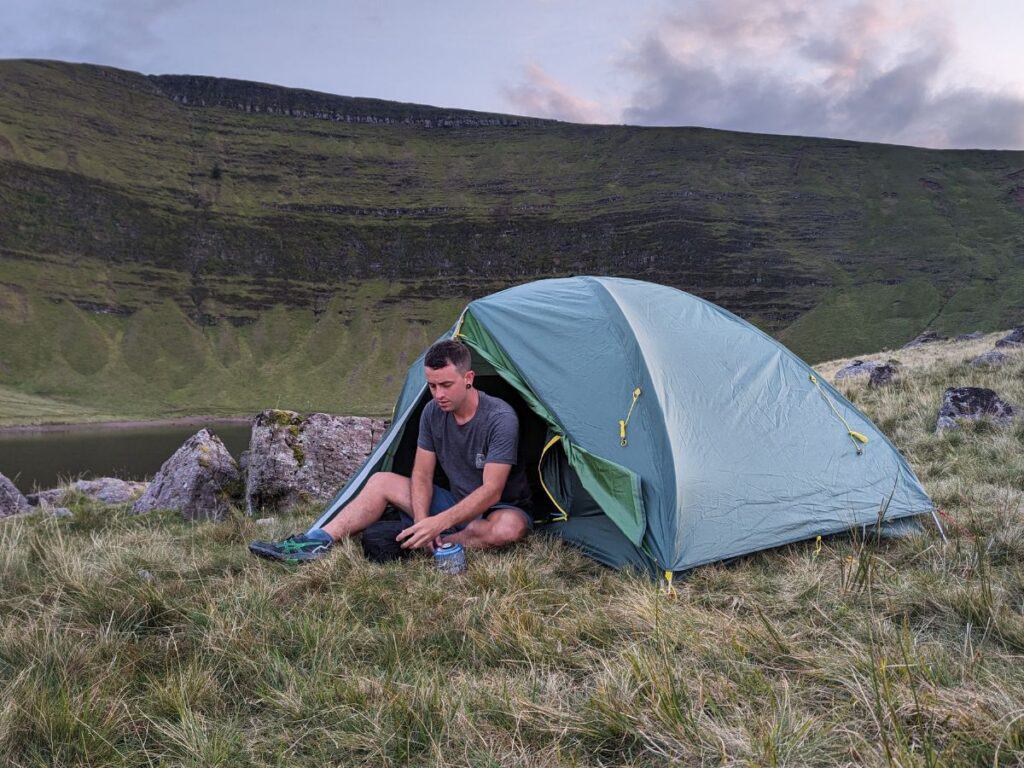
Is Wild Camping Legal? UK Laws and Regulations
When it comes to the legalities of wild camping in the UK, the rules differ across regions. Understanding the wild camping laws and regulations ensures a hassle-free and responsible experience. Let’s break it down region by region:
Wild Camping in England and Wales:
In England and Wales, the majority of the land is privately owned, which means wild camping without the landowner’s permission is technically illegal. It’s not a criminal offence, technically wild camping is a civil offence. This implies that if you’re caught wild camping, you can’t be arrested, but you can be asked to move on or, in some cases, fined.
There’s one exception: Thanks to the Dartmoor National Park Authority, you’re allowed to wild camp for up to two nights in the same spot in Dartmoor, provided you stay at least 100 metres away from roads and other structures.
Wild Camping in Scotland:
Scotland is more lenient, thanks to the Land Reform (Scotland) Act 2003 and the Scottish Outdoor Access Code. This means you can go wild camping on most unenclosed lands. However, certain parts of Loch Lomond and the Trossachs National Park have by-laws prohibiting wild camping due to overuse and environmental concerns. Always check local regulations before setting up your tent for wild camping.

Wild Camping in Northern Ireland:
In Northern Ireland, the wild camping laws mirror those of England and Wales. Most of the land is private, making wild camping without permission technically a no-go. However, many landowners might grant permission if you ask politely and assure them you’ll practice responsible wild camping.
Wild Camping in National Parks:
While national parks like the Lake District or Snowdonia are hotspots for nature enthusiasts, wild camping is technically not allowed without the landowner’s consent. However, if you stick to higher ground, away from populated areas and main paths, and ensure you leave no trace, you’re less likely to run into issues.

Trespassing and the Law
Venturing into the realm of wild camping often brings up the contentious issue of trespassing. For many outdoor enthusiasts, the lines can blur, especially when it comes to understanding the difference between a peaceful night under the stars and a legal misstep. So, let’s shed some light on trespassing and its implications within the UK legal framework.
What is Trespassing?
At its core, trespassing refers to entering or remaining on land without the permission of the landowner or lawful occupier. In the context of wild camping, this would mean setting up your tent and camping on land without obtaining prior consent.

Trespassing in England and Wales:
In England and Wales, trespassing is largely seen as a civil offence rather than a criminal one. This distinction is crucial. Being a civil offence means the landowner can ask you to leave, and if you refuse, they might take civil legal action. However, they can’t have you arrested solely for trespassing.
However, if your actions escalate to causing damage, disruption, or if you’ve previously been asked to leave and return, then it could become aggravated trespass, which is a criminal offence.
Trespassing in Scotland:
Scotland operates under a different system. Thanks to the Land Reform (Scotland) Act 2003, there’s a more established “right to roam” allowing people to access most lands and inland waters for recreation, as long as they act responsibly as outlined in the Scottish Outdoor Access Code. Trespassing, as understood in England and Wales, isn’t the primary concern here, but failure to follow the Access Code can lead to issues.
Trespassing in Northern Ireland:
Like England and Wales, in Northern Ireland, most land is owned privately, and trespassing without the owner’s consent is frowned upon. However, as in England and Wales, it remains a civil matter unless there’s an escalation leading to aggravated trespass or damage.
The Grey Areas:
While the laws might seem clear-cut, wild camping in the UK often operates in a grey area. Many wild campers choose remote locations, setting up camp late and packing up early, leaving no trace. This “stealth camping” approach minimises the risk of confrontations and promotes responsible enjoyment of nature.
In conclusion, trespassing laws in the UK are intertwined with the rights and expectations of landowners and the desire of campers to connect with nature. The essence remains: always strive to be respectful, informed, and act responsibly. After all, the wilderness is for everyone to enjoy, but it’s also everyone’s responsibility to protect.
What is the Punishment for Wild Camping
The allure of the great outdoors can sometimes lead us astray, tempting us to set up camp in unauthorized areas. But what does this mean in terms of actual penalties in the UK?
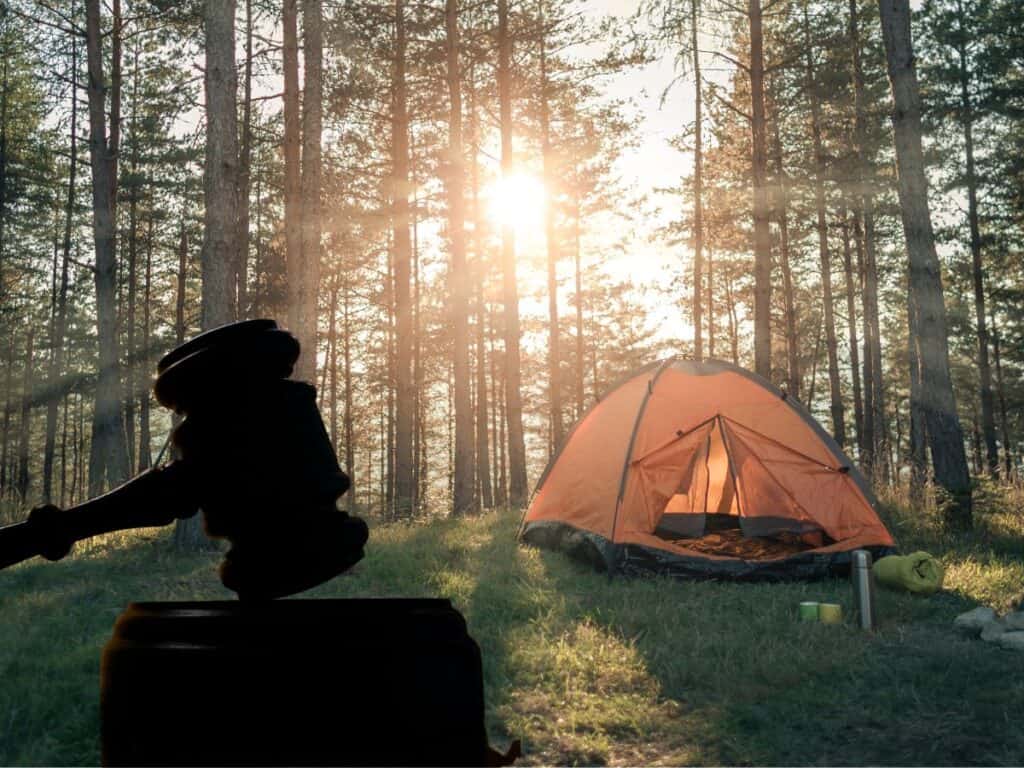
So, what happens if you’re caught wild camping where you shouldn’t be?
The specific consequences can vary based on where you’re caught and the circumstances of your camping. Here’s a breakdown:
Fines and Penalties:
Civil Offence: In places like England and Wales, wild camping without the landowner’s permission is a civil offence, not a criminal one. This means you can’t be arrested solely for camping. However, if the landowner chooses, they can pursue a civil case against you, which could result in fines, but this is relatively rare.
Aggravated Trespass: If you’re camping in a manner that disrupts or damages the land or property or refuses to leave after being asked, you could be charged with aggravated trespass. This is a criminal offence and can result in a fine or even imprisonment, although the latter is very uncommon for wild camping cases.
Dartmoor National Park: While Dartmoor allows wild camping on unenclosed land, there are areas where it’s prohibited. Camping in these areas can lead to a fine, typically enforced by the National Park Authority.
Scotland: Here, you’re generally free to camp on most unenclosed land. However, areas like some parts of Loch Lomond and the Trossachs National Park have by-laws in place. Violating these by-laws can result in a fine.
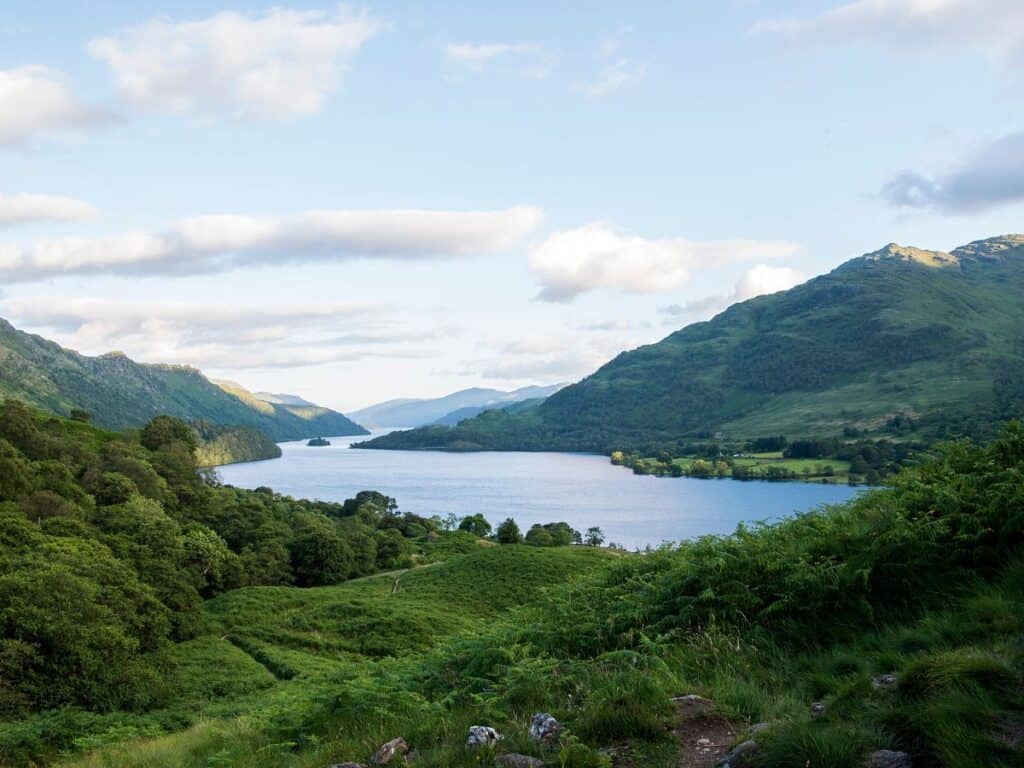
Other Consequences:
Being Asked to Move: The most common consequence of unauthorized wild camping is simply being asked to pack up your wild camping gear and leave by the landowner or their representatives.
Damage to Reputation: If you’re a frequent camper or part of an outdoor community, being known for irresponsible or illegal camping can tarnish your reputation.
Environmental Impact: Camping without adhering to ‘leave no trace’ principles can cause environmental harm. While this might not result in immediate penalties, the long-term consequences to the environment and future generations are profound.
Potential Bans: If areas experience too much unauthorized or irresponsible wild camping, it could lead to stricter regulations or outright bans in the future, impacting the entire outdoor community.
While the immediate financial penalties for unauthorized wild camping in the UK aren’t typically severe, the indirect consequences and potential damage to both the environment and the outdoor community’s reputation can be long-lasting. As always, it’s best to wild camp responsibly, seek permissions where necessary, and cherish the natural world that provides us with such unparalleled experiences.
Responsible Wild Camping: How to Avoid Penalties
The joy of wild camping comes from its immersion in nature, far from the humdrum of daily life. But with this freedom comes a responsibility to ensure that our presence doesn’t harm the environment or run afoul of the law. So, how can you make the most of your wild camping experience in the UK without landing in trouble?
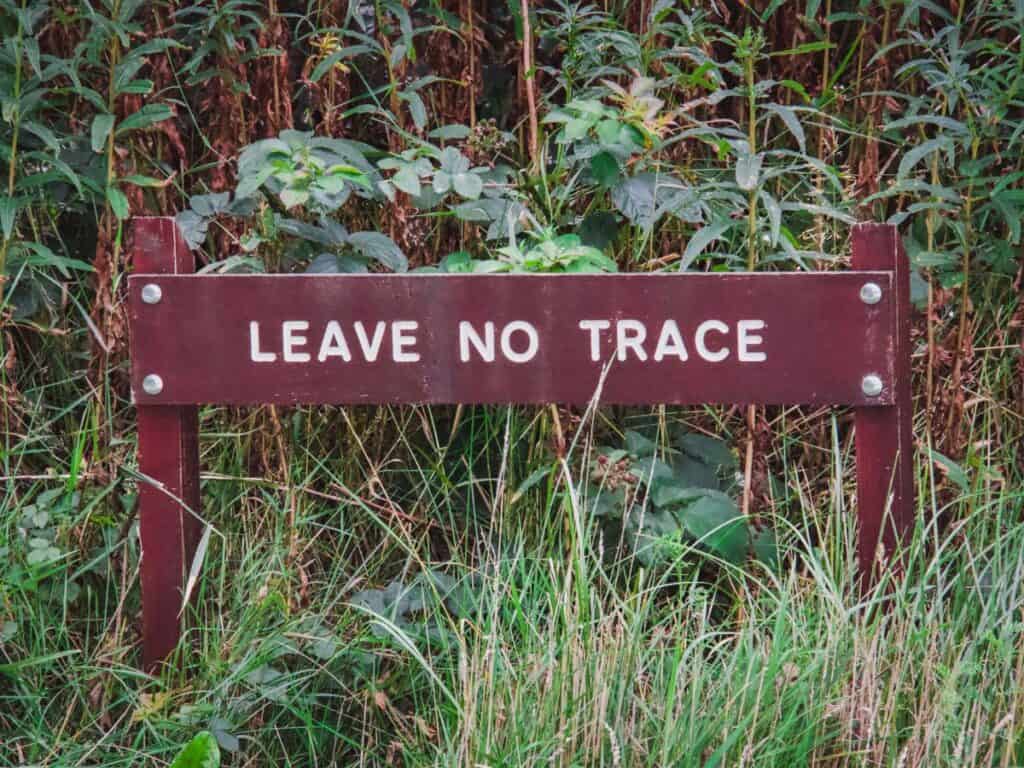
Know the Laws and Restrictions:
Research Beforehand: Before you head out, make sure you know the wild camping rules for the specific area you’re visiting. This might mean checking with national park authorities or local councils.
Scotland vs. The Rest: While Scotland generally allows wild camping, England, Wales, and Northern Ireland have more restrictive rules. Always be informed about the differences.
Ask for Permission:
Private Land: Most of the land in the UK, especially in England and Wales, is privately owned. If you’re unsure about the rules of a particular area, it doesn’t hurt to ask the landowner for permission. Many landowners are understanding and might even suggest great spots if approached respectfully.
Dedicated Sites: Some areas, like the Lake District, have dedicated spots for wild camping. Getting a camping permit can give you peace of mind.
Leave No Trace:
Pack In, Pack Out: Always take all your rubbish home. Leaving waste behind is not only harmful to the environment but can also attract penalties.
No Fires: Lighting fires can be detrimental to the environment and is often one of the main reasons campers get into trouble. Use camping stoves if you need to cook.
Stay Low-Key:
Set Up Late, Leave Early: If you’re in a grey area concerning permission, arriving late and departing early can reduce the chances of disturbances or confrontations.
Avoid Crowded Areas: Popular tourist spots or visitor attractions might not be the best places for wild camping. Seek out more remote locations where you can truly enjoy nature without drawing attention.
Be Respectful:
Respect Wildlife: The UK’s wilderness is home to diverse fauna. Ensure your camping activities don’t disturb local wildlife.
Keep Noise Levels Down: A significant aspect of wild camping is the tranquillity it offers. Be mindful of noise to ensure you and others can enjoy the serene environment.
Responsible wild camping is about more than just avoiding penalties; it’s about fostering a deeper connection with the natural world and ensuring future generations can enjoy the same experiences. By being informed, respectful, and always leaving no trace, you can immerse yourself in the beauty of the UK’s landscapes without any worries. Enjoy your next wild camping trip with the knowledge that you’re doing it right!
Wild Camping Alternatives
Sometimes, the risk of penalties or the thought of treading on delicate ecosystems might dissuade you from wild camping. But don’t let that put a damper on your love for the outdoors! The UK is teeming with alternative options that can give you a similar sense of adventure.
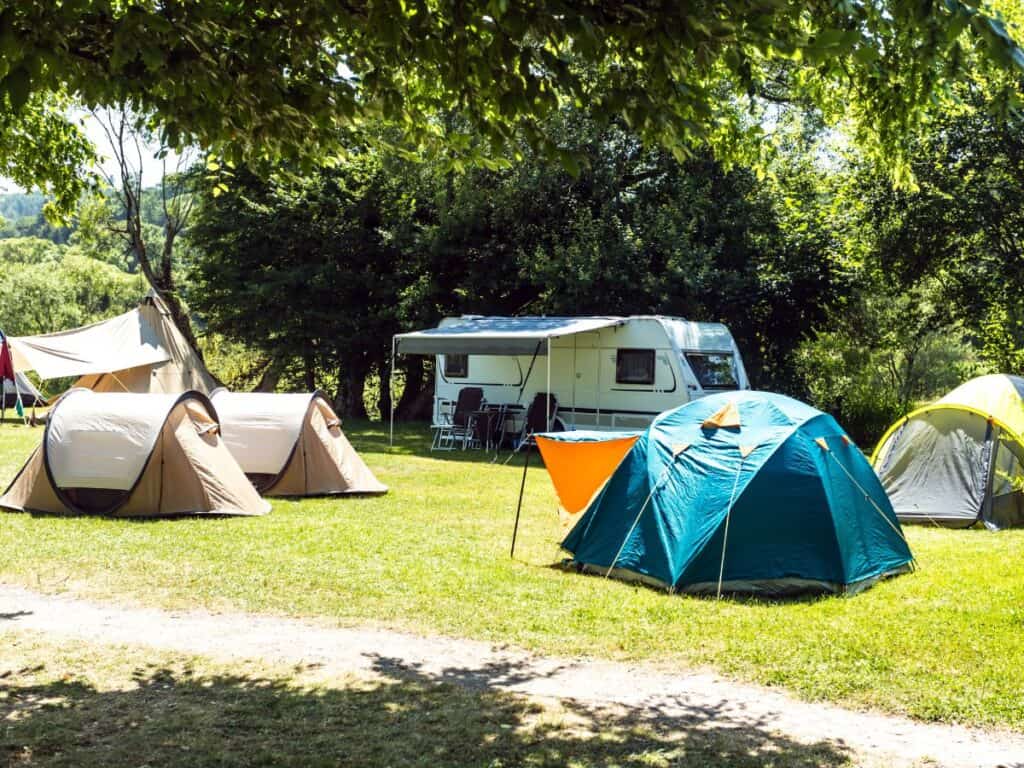
Designated Campsites: These are scattered across the UK, from the highlands of Scotland to the rolling hills of Wales. Designated campsites provide campers with the opportunity to be close to nature while also having easy access to amenities. These sites often come with facilities like toilets, showers, and sometimes even a shop or café.
Farm Camping: Many local farms offer camping spots on their land. This not only provides a unique experience but also supports local businesses. These sites usually lie on the borders of the country’s incredible national parks, providing a blend of rural life and natural beauty.
Bothy Stays: Exclusive to Scotland, bothies are small, basic shelters in remote locations, maintained by volunteers. They offer a rustic experience, akin to wild camping, but with the added advantage of a roof over your head.
In essence, while wild camping offers an unparalleled experience, these alternatives ensure you can still enjoy the UK’s stunning landscapes, often with a few added comforts or without the concerns of legal repercussions.
So, the next time you’re yearning for an outdoor adventure, remember that there’s a myriad of ways to experience the UK’s wilderness!
Final Thoughts
Embracing the freedom of wild camping in the UK is an unmatched experience. While it’s crucial to respect both nature and regulations, the UK offers numerous alternatives for those seeking a different kind of adventure. No matter your choice, the essence lies in connecting with the majestic outdoors.
Interested in diving deeper into the world of wild camping? Don’t miss our comprehensive guide on Wild Camping for Beginners here!
Wild Camping Legalities FAQ
Can I be fined for wild camping?
Yes, if you camp in prohibited or protected areas, you may be fined.
Are there places in the UK where wild camping is allowed?
Yes, Dartmoor National Park is the only area and one example where wild camping is permitted in specific areas.
What should I do if I’m unsure about where to camp?
Always seek permission from the landowner or check local regulations before setting up camp.
Is it possible to wild camp without breaking any rules?
You can enjoy wild camping without legal concerns by seeking appropriate permissions, sticking to allowed zones, and following ethical camping practices.

About the Author
Steve Cleverdon is an adventure blogger dedicated to helping outdoor enthusiasts make the most of their outdoor experiences. With years of travel and many epic adventures including a 3000-kilometre solo hike across New Zealand, Steve has amassed practical knowledge on outdoor gear. You can learn more about his adventures here. Through expert reviews, recommendations, and guides, he equips his readers with the best gear for their next adventure. If you want to send Steve a quick message, visit his contact page here.

